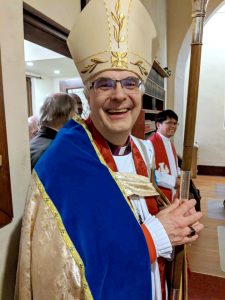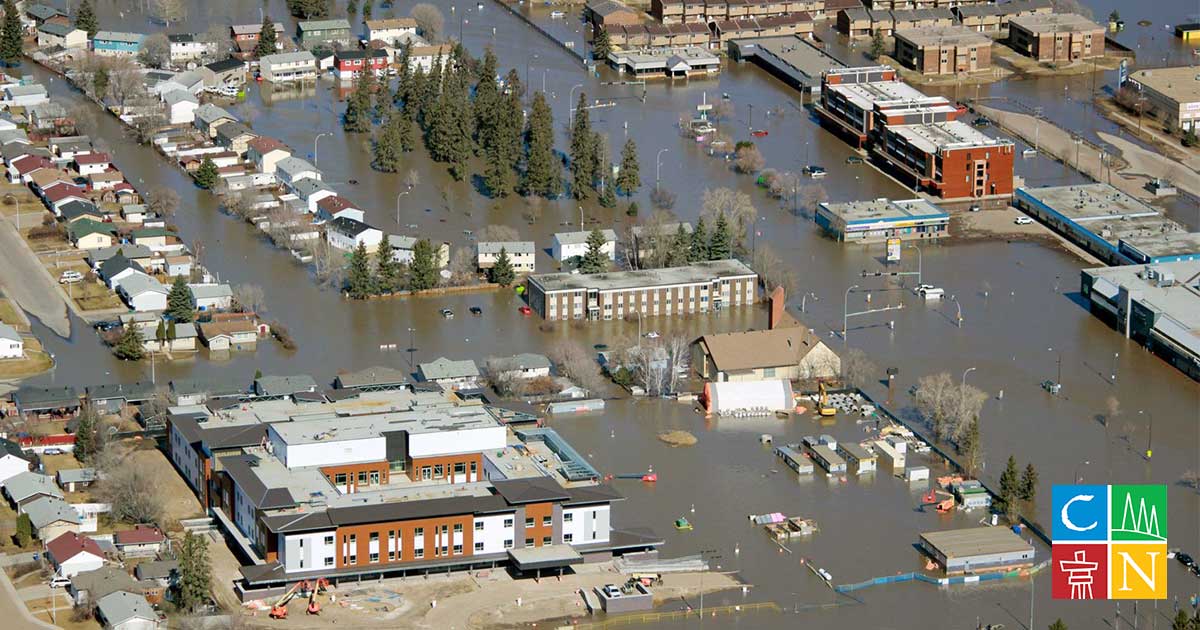from the Summer 2020 edition of Contact
A conversation with Bishop David Greenwood of the diocese of Athabasca
By Matt Gardner for Contact
Elected bishop of the diocese of Athabasca last November, Bishop David Greenwood was consecrated on Feb. 21. He is currently working from his home in Fort McMurray until the end of June, when his wife Benita—who works as a teacher—finishes the school year. The couple then plan to move to Peace River.
Greenwood was raised in Alberta and has lived in the diocese since 1988, when he moved to Fort McMurray with his young family. For 30 years, he worked for Syncrude Canada Ltd. as a computer programmer, systems designer and architect, reporting architect and designer, and supervisor. Sensing a call to serve the church, he was ordained as a vocational deacon in 2004 and as a priest in 2015. He served as an honorary assistant at All Saints Fort McMurray and as an interim priest in the parishes of Northern Lights and Athabasca before his election as bishop.
Contact spoke with Bishop Greenwood on May 5 to learn of developments in his diocese and his plans going forward. This interview has been edited for brevity.

Q. How are you handling your episcopal ministry in the time of COVID-19?
A. Where do I start? It’s been COVID-19, it’s been floods, it’s been break-ins, it’s been all sorts of interesting things.
I’m working remotely. We do a lot of Zoom meetings, a lot of phone calls, a lot of emails. My office is basically the computer right now, hardly any face-to-face interactions at all. It’s very busy reacting to everything going on.
How am I doing it liturgically? We’re doing a lot of recorded services and Zoom services throughout the diocese. A whole bunch of the priests have really stepped in there, and we have a number of services going on. In addition to that, I am winding my way through the diocese virtually. Last week I celebrated with Beaver Lodge. We had a Zoom service. Beaver Lodge is about 950 km away from Fort McMurray, so it’s interesting how this is all possible now.
How am I doing emotionally/physically? It’s a stressful time, as I imagine it is for everybody. It’s definitely out of our norm. But it’s encouraging too, by the number of positive reinforcements we’ve received, especially the clergy as they reach out to people through email and services, and they find out that they have a much wider audience than they had in their typical Sunday services beforehand.
Q. Are there any major events coming up in Athabasca?
A. The next major thing will totally depend on COVID-19, because we’ve suspended services as well—whether we can gradually reintroduce that. I have a meeting actually this Thursday with the bishops of Calgary and Edmonton looking at [how] maybe we can do it in conjunction with them from a provincial point of view, since the province is setting out the rules for that.
It’s a synod year for us, but how effective of a synod we can hold will also depend on COVID-19 and how that works.
Q. What are your current priorities for the diocese?
A. [Aside from] COVID-19 and everything else, we’ll be looking at how can we stabilize and grow the diocese. As with many churches and parishes across the country, most of our parishes are quite senior in age. If we don’t do something so that families and young people come in, in the next 10 or so years, we’ll be looking at closing other parishes. I don’t really want to be a bishop closing parishes if I can avoid it, so that’s a critical concern for us.
I think it’s critical that clergy know they’re supported. We are a very sparse diocese in that we are geographically very large, but numerically small. As a result of that, clergy are often on their own, [with] not a lot of interactions. The support of the clergy I think is very important for me, that they know they’re engaged with and that they are visibly supported.
Those are two broad areas I can say. It’s an emphasis on trying to get parishes healthy so then the diocese will be healthy.
Q. What happened with the break-in at the synod office?
A. I guess as break-ins go, it was very minor. They broke a window, they threw some stuff around, they stole a computer and some keys. It’s more of a nuisance than anything. But in the midst of everything else happening, it was just one more thing.
Q. What kind of an impact have floods been having on life in the diocese?
A. Quite large. At the diocesan level, the synod office was flooded and the cathedral basement was flooded. Quite a number of parishioners have been affected by the flooding. That’s going to be a hardship, because being on a flood plain, the flood insurance is often not there or it’s underinsured for the damage that does happen.
Q. Is there anything else you’d like rest of the church to know about the direction of diocese of Athabasca?
We’re trying to become self-sufficient. We are trying to live the kingdom of God and be filled with Christ, be filled with the Spirit, and we are dealing with all that nature throws at us a day at a time and coming through it. We’re praying, we’re holding together, and we’re moving on.
Interested in keeping up-to-date on news, opinion, events and resources from the Anglican Church of Canada? Sign up for our email alerts .

